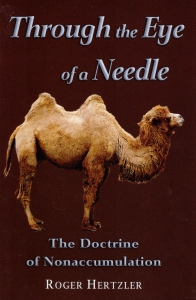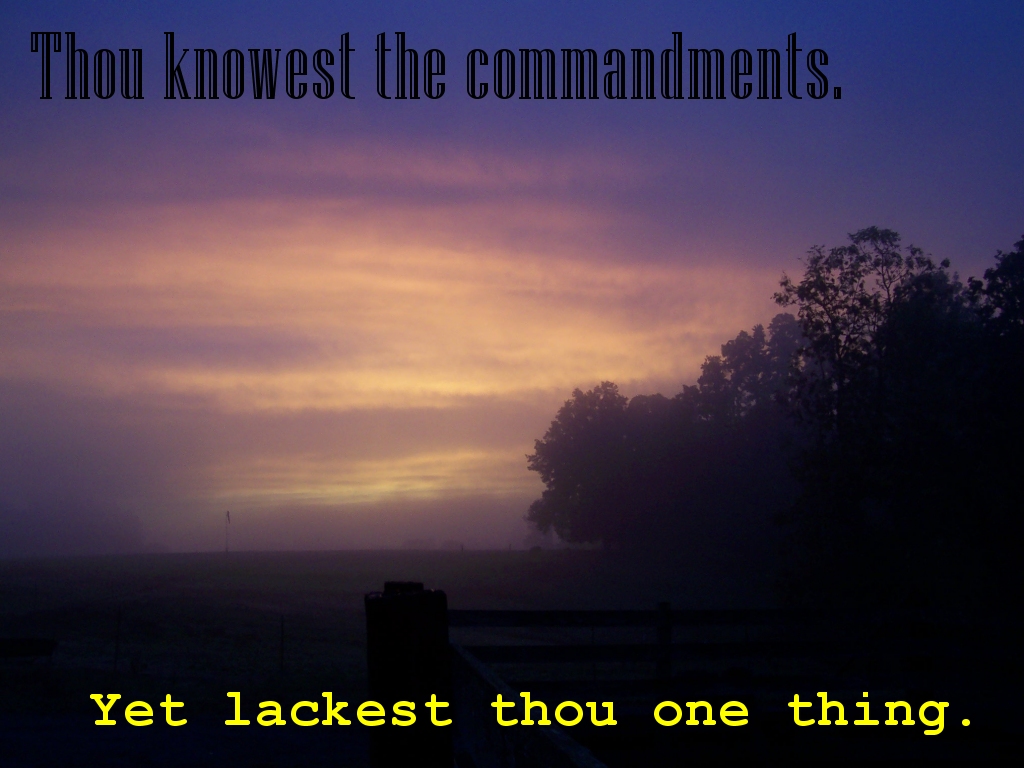Matthew 19:16-30
I’ve got to hand it to Jesus — He just didn’t come across as “seeker friendly” all the time. The event recorded in this passage could be among the exhibits portraying that truth. So I remind myself of this tidbit in Mark’s record: “Then Jesus beholding him loved him” (Mark 10:21).
- And, behold, one came and said unto him, Good Master, what good thing shall I do, that I may have eternal life?
- And he said unto him, Why callest thou me good? there is none good but one, that is, God: but if thou wilt enter into life, keep the commandments.
- He saith unto him, Which? Jesus said, Thou shalt do no murder, Thou shalt not commit adultery, Thou shalt not steal, Thou shalt not bear false witness,
- Honour thy father and thy mother: and, Thou shalt love thy neighbour as thyself.
- The young man saith unto him, All these things have I kept from my youth up: what lack I yet?
- Jesus said unto him, If thou wilt be perfect, go and sell that thou hast, and give to the poor, and thou shalt have treasure in heaven: and come and follow me.
- But when the young man heard that saying, he went away sorrowful: for he had great possessions.
- Then said Jesus unto his disciples, Verily I say unto you, That a rich man shall hardly enter into the kingdom of heaven.
- And again I say unto you, It is easier for a camel to go through the eye of a needle, than for a rich man to enter into the kingdom of God.
- When his disciples heard it, they were exceedingly amazed, saying, Who then can be saved?
- But Jesus beheld them, and said unto them, With men this is impossible; but with God all things are possible.
- Then answered Peter and said unto him, Behold, we have forsaken all, and followed thee; what shall we have therefore?
- And Jesus said unto them, Verily I say unto you, That ye which have followed me, in the regeneration when the Son of man shall sit in the throne of his glory, ye also shall sit upon twelve thrones, judging the twelve tribes of Israel.
- And every one that hath forsaken houses, or brethren, or sisters, or father, or mother, or wife, or children, or lands, for my name’s sake, shall receive an hundredfold, and shall inherit everlasting life.
- But many that are first shall be last; and the last shall be first.
I hadn’t remembered that Jesus “tossed in” an item not in the Ten Commandments: “Thou shalt love thy neighbour as thyself.” And He “tacked it on” after citing only five items from the Ten Commandments.
Well, after noticing that, I took another look at those five, wanting to see what Jesus omitted. He left off the “Top Three” (which are most directly God-ward!), the fourth one (about remembering the Sabbath Day, to keep it holy), and the last one (about covetousness).
I don’t want to make any big deal of this silence or omission, but I’m particularly fascinated by Jesus’ not raising the first three with this man wanting to receive eternal life. One easy conclusion from this is that this fellow didn’t need to be told something he already knew and lived as best he could.
Thing is, he also claimed to live according to all the other commandments Jesus cited. And Jesus didn’t challenge him about the claim!
And yet, the young man wasn’t persuaded he would inherit eternal life. (Or else he was, and wanted Jesus to confirm that.)
Then Jesus seems to dramatically shift the focus and emphasis of the discussion: “If thou wilt be perfect…” This fellow’s interest was in what his lot would be after death. Jesus expanded his attention to encompass perfection and fulfillment in this life. And how He did it still shocks and unsettles me, for it hits so close to home, even though I’m among the poorest in my circles:
“If thou wilt be perfect, go and sell that thou hast, and give to the poor, and thou shalt have treasure in heaven: and come and follow me.”
Young man, for earthly perfection and fulfillment and for the heavenly inheritance, sell what you have, give the proceeds to the poor, and follow Jesus. In other words,
- “Thou shalt not covet.”
- “Thou shalt have no other gods before me.”
Two of the “missing” commandments! Plus a very practical, very hard way to “love thy neighbour as thyself.”
Suppose — just for the sake of discussion, you know — that my own temporal and eternal fulfillment depended on the practice of verse 21. How full would I be?
Among Jesus’ observations to His disciples after the materially-satisfied, materially-attached rich young man left, this first one on record: The rich with difficulty enter into the kingdom of Heaven.
How is it that I do not find that personally unsettling to my own sense of being eternally secure?!
 For his part, Peter had his own real-to-life question. My own question is similar, albeit not so all-encompassing. Jesus’ answer to Peter and me leaves me scratching my head as I wonder where my house (Luke 18:28-30) and lands (Mark 10:28-30) are.
For his part, Peter had his own real-to-life question. My own question is similar, albeit not so all-encompassing. Jesus’ answer to Peter and me leaves me scratching my head as I wonder where my house (Luke 18:28-30) and lands (Mark 10:28-30) are.
Though I don’t understand that, my commitment to Jesus remains unwavering. I’m “in this” for Him, not real estate.
